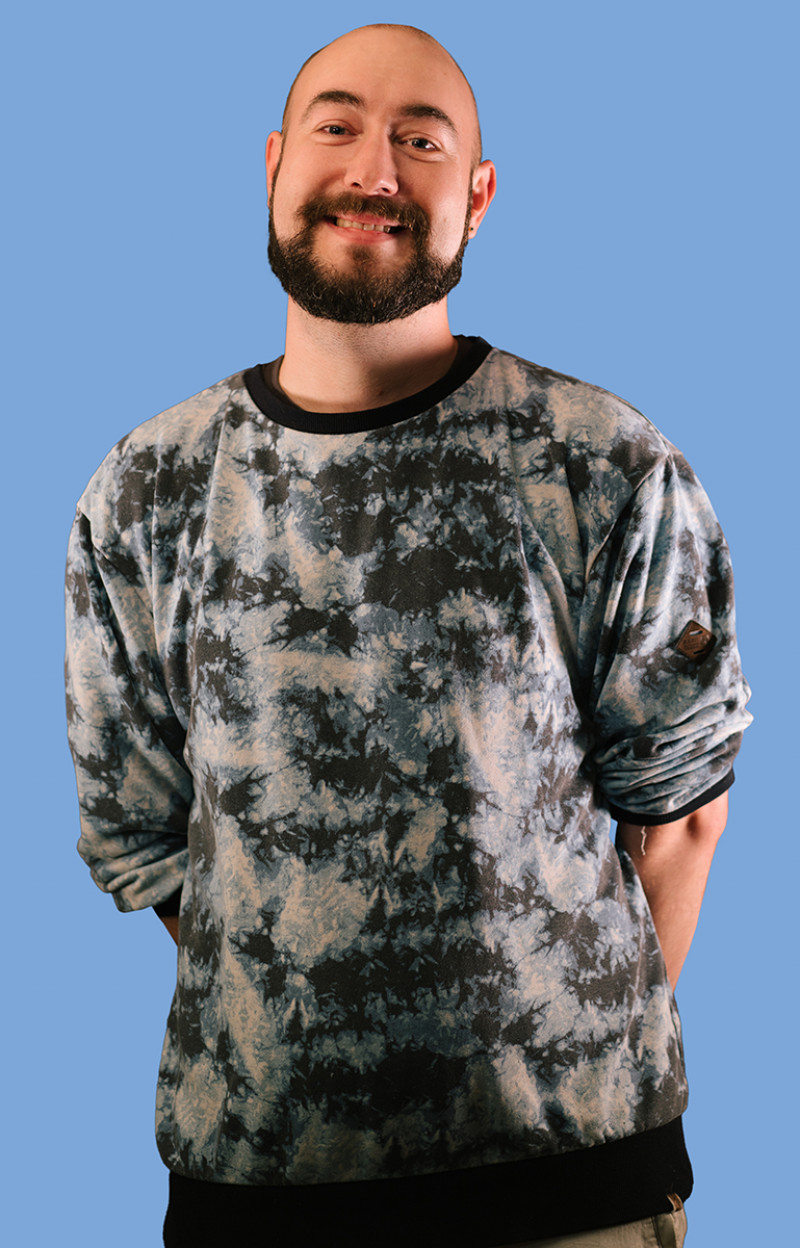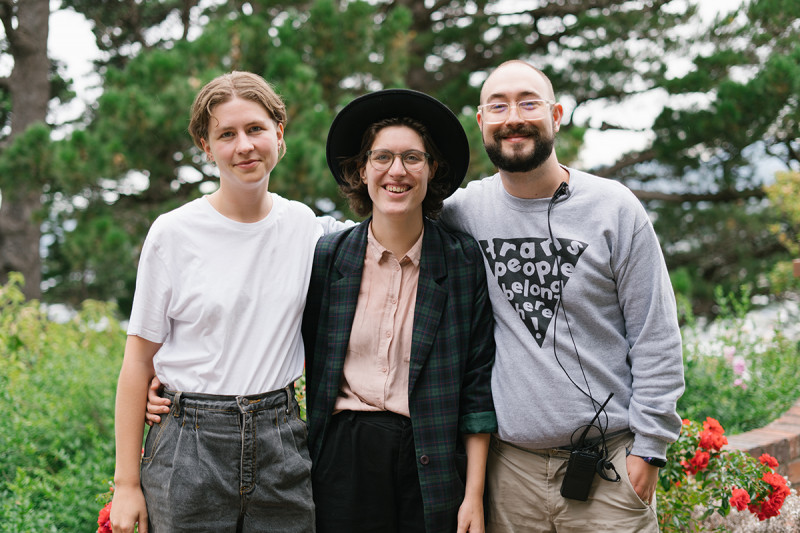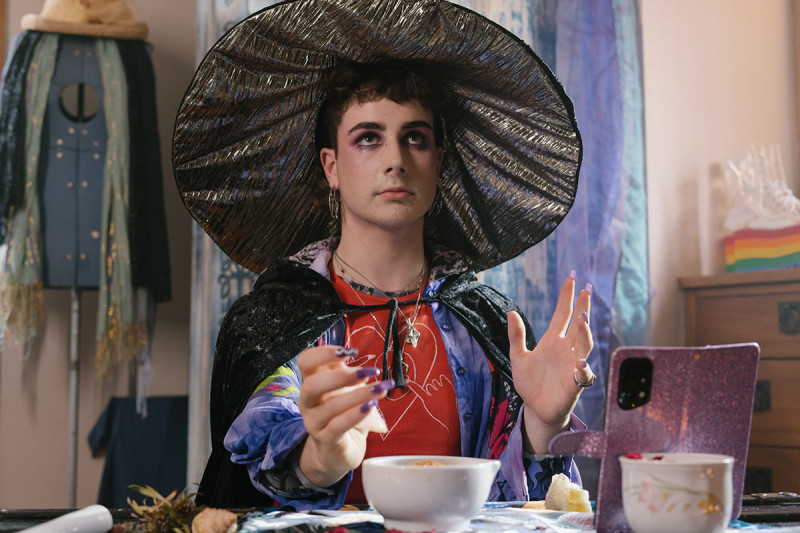
Thomas Coppell

Elsie Bollinger, Sally Bollinger, Thomas Coppell
Photo by Vanessa Cone

Linus Lloyd as Leith in Little Apocalypse
Wellington Silver Screeners: Thomas Coppell by Alessia Belsito-Riera
In our Wellington Silver Screeners series, Alessia Belsito-Riera shines a spotlight on the movers and shakers working in the film capital of New Zealand.
A theatre kid from the beginning, Thomas Coppell (they/them) cracked into the film industry straight after high school when their “beautiful grandfather reached out to a local producer he knew”. While studying film and media at university, Thomas worked hard as a production assistant within the company. After years of dedication to the craft, they have earned credits as a writer and producer on a slew of projects. Their newest endeavour, Little Apocalypse, is a supernatural comedy series by, for, and about Rainbow young people. The latest short film they produced, Gate Crash, is making its way through the local and international festival circuit. I caught up with Thomas to chat about it all!
So you got an early start in the film industry?
I think the thing that supercharged my career was that I was already working in the industry by the time I graduated university. I already had three years within a company, and I was able to learn and do a lot of things you normally don’t get to when you’re doing it yourself. When I graduated, I took on a full-time role with them as a production manager. We did a couple of puppet shows for preschoolers and then we also made Doubt: The Scott Watson Case. While I was doing all that, one of my friends from university and I made a short animated film called Shmeat, which ended up being a finalist at the New Zealand International Film Festival (NZIFF) and also at Spain’s Sitges International Fantastic Film Festival. After the success of Shmeat and having worked for that company for six years, I was very tired, because it was really long hours and hard work. I hadn’t been a young person, because I’d been studying and working in a very punishing industry. So I decided to quit and focus on my own slate and maybe never make film or TV again.
I got a full-time job at the stock exchange at NZX. But I was kind of determined after working for someone else to start my own production company where I could guide the kaupapa. A couple of months into starting that new job I picked up two NZ On Air-funded web series, Tragicomic and Happy Playland with The Candle Wasters. I spent the next couple of years trying to build a pathway up the production ladder as a producer, so that I could create a sustainable flow of work for myself. I basically kept knocking at the door of bigger funding, and trying to create an environment where I could get commissions big enough that I could exist. I got a funded project from NZ On Air, which was enough for me to quit my day job and take the plunge full time into the industry, which I’ve been doing for the last two-and-a-bit years.
And you successfully started your production company! What was your intention with Tomorrow, Rain?
I started Tomorrow, Rain because I wanted to run my own company and have my own set of values, my own focus, and know that I’d look after people, break rules, and do it my way. The kaupapa of Tomorrow, Rain is still forming because it has shifted with every project. Initially, my focus was on making content for and by creatives that were a double shot of diversity, so that’s everything opposite from a white, cisgendered, able-bodied, straight man. And I did that, but the projects that I did really consistently had this thread of queerness throughout. I was frustrated as a young queer person never seeing myself reflected on screen, so Tomorrow, Rain’s current focus is making content by queer people for queer people.
I also have a huge passion for making content for kids and young people. It makes me really proud because everything I make has purpose. If we don’t make content for Kiwi kids and young people, then no one will, and our culture will die. That motivates me in the stories I want to tell. We’re a very small independent company based here in Wellington. I love Wellington, I’m never gonna leave. I desperately want to make the stuff I want to make here. At the moment I’m quite happy being a small, focused company that makes stuff that matters.
What is filming in Wellington like?
I love the community of Wellington and I love it as a filmmaking space. Wellington is super supportive, easy to deal with, and is quite a low-cost region to work in. Our crew are amazing because we upskill so many of them on the big international productions. I think we have a really great community here, but I think we just don’t get invested in enough. Something that I’ve experienced as a person who’s been really focused on working with women and non-binary people, is I think people need to open their minds a bit to who can fill the roles in their productions, because we’re all amazing, talented, smart people.
Tell me about Little Apocalypse.
I was reflecting on my relationship with my little sister and some of the magic that we would create together as kids. I have this very visceral memory of being a 17-year-old who’d had my heart broken and I was making this makeshift spell with my little sister where I burnt the names of all the people who wronged me. I was going through this deep emotional turmoil and she was just having the time of her life. I was obsessing about that perspective difference, which really springboarded the relationship between Cole and Leith, who are the main characters of Little Apocalypse. The show was inspired by that relationship, but it was also me wanting to make a show that I wish I had as a kid.
When we pitched Little Apocalypse, we pitched Leith as a queer AMAB (assigned male at birth). It was already embedded in the story, and we didn’t even question it because it was inspired by my youth. We had huge support from both TVNZ and NZ On Air, and it was only in conversations with them that we realised that Little Apocalypse would be the first New Zealand kids’ television show where the main characters were queer, and unashamedly queer. So when we heard that, we were like, ‘let’s double down on the gay’.
We were really excited to have that moment in history, but also kind of disappointed that we were the first. I think what’s put off a lot of queer storytellers from telling our stories is the backlash. I was able to settle myself by knowing I wasn’t making the show for those people, I was making the show for queer people and the people who love them. So I think it’s really important that more stories like this are told. I want kids to see this kind of reality of being a queer person, that actually we do just exist, and we can be superheroes and witches and ghosts and monsters. That’s a key part of why we wanted to tell the story the way we did, because we have been boxed into certain narratives and that limits our possibilities for what we see for ourselves. I remember as a 13-year-old watching Brokeback Mountain, and it made me feel like vomiting because they hurt so much and were never happy. I was like, ‘is this my future?’ While those stories are necessary, if those are the only stories we ever get, that just completely limits the potential for our young people. If we tell them that they’re going to be sad and depressed and alone, then that’s what they’re going to believe. What we need to tell them is that they’re going to be filled with queer joy and surrounded by a wonderful community. Yes, there are the hardships, but actually it’s all worthwhile. When I’m approached about queer stories, I just say ‘more’. We need to see the fullness, sadness, loss, hurt, joy, happiness, success. We just need to see all of it.
What is Gate Crash about and how has the festival experience been?
The festival experience was really good. Getting into film festivals feels so luminous. It’s unpredictable and very subjective, so any win is a win. Gate Crash was directed and written by Paloma Schneideman, who was commissioned by Toi Whakaari. We were given seven actors and told to make a short film for $15,000. It really talks to that teenage experience where you start questioning whether the people that you’ve grown up with in high school are your friends by circumstance and if you’ll carry the friendship forward.
What are you working on now? Will there be a second season of Little Apocalypse?
Well, I don’t know. The hard thing about this industry is it’s competitive and there are no guarantees. We’d love to have a second season, and I’m currently developing towards that potential. I’ve got a couple of other TV series in development, I’m working with Vicky [Pope] and Paloma on a feature film, and I’ve got a slate of documentary content as well. At the moment I’m in development hell, waiting for the next project to land. But I’m really excited about all the beautiful, wonderful people that I’m working with. No matter what I’m doing it’s queer joy, either because it’s supporting queer creatives or it’s just literally queer joy.
What advice would you give people who are starting out in the capital’s film industry?
The thing that we forget about being Kiwis is everyone has two degrees of separation. The industry is actually incredibly small. It’s a lot easier to break into than it might feel. It’s just about meeting people, going to networking events, reaching out, and being front of mind. But also just do it. Just make stuff. You can only really learn by doing it. There’s only so much schooling you can do because every project is so different and unique. So just do it and put yourself out there.
View more articles from:
« Issue 207, October 24, 2023

